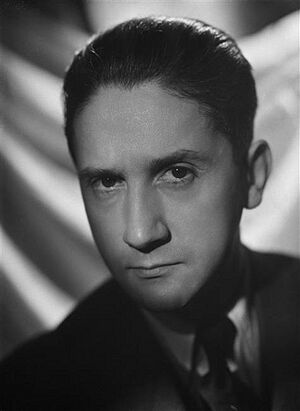Roger Désormière facts for kids
Roger Désormière (pronounced roh-ZHAY day-zawr-MYAIR) was a famous French conductor. He was born on September 13, 1898, and passed away on October 25, 1963. Roger was very keen on supporting new music by composers of his time. He also loved to conduct older French music from the early 1700s.
Contents
Roger Désormière's Life and Career
His Early Life and Studies
Roger Désormière was born in a town called Vichy in France. He went to the Paris Conservatoire, which is a famous music school. There, he learned from many great teachers. He studied the flute, how to compose music, and how to conduct an orchestra. In 1922, he won a special award called the Prix Blumenthal. The next year, he joined a group of artists called the Ecole d’Arcueil.
Conducting for Ballets
Roger Désormière started his conducting career with two famous ballet companies. These were the Ballets suédois (Swedish Ballets) and Sergei Diaghilev's Ballets Russes (Russian Ballets). He conducted the very first show of a ballet called Relâche in 1924. This show was special because it combined film and music.
He then worked with Diaghilev's company until Diaghilev died. During this time, Roger conducted the first performances of several important ballets. These included Barabau, The Prodigal Son, and Le pas d'acier.
Music for Movies
From 1932, Roger Désormière also started working on music for films. He composed music for movies like La Règle du jeu. He also led the orchestra for more than 20 other films. Some of these famous movies include Partie de campagne, Remorques, and La Belle et la bête.
Important Recordings
Roger Désormière made the first full recording of an opera by Claude Debussy. The opera was called Pelléas et Mélisande. He recorded it in Paris in 1941, during a difficult time when France was controlled by another country. This recording was released in 1942. He also recorded parts of another opera called L'étoile during the war.
Helping Others During Difficult Times
Roger Désormière had strong beliefs about helping people. He was part of a group that supported workers' rights. During the time France was occupied, he joined a group called the Front National des Musiciens. This group was made up of musicians who resisted the occupation.
When the composer Darius Milhaud had to leave France, Roger Désormière helped him. He saved Milhaud's paintings and personal items. He even paid the rent for Milhaud's apartment while he was away.
Supporting New and Old Music
Roger Désormière became very well-known for supporting music by composers of his time. He helped composers like Erik Satie, Olivier Messiaen, and Pierre Boulez get their music heard. He also loved to bring back older music. He edited and performed pieces by composers like François Couperin and Jean-Philippe Rameau.
From 1937, he was a main conductor for the Paris Opéra-Comique. He conducted many operas there. From 1945 to 1946, he also became a director at the Paris Opéra.
His Later Years
In 1952, while driving in Rome, Roger Désormière had a serious stroke. This meant he could no longer do any musical activities. He had trouble speaking for the rest of his life and lived quietly. He passed away in Paris in 1963.
First Performances He Conducted
Roger Désormière conducted the very first performances of many important musical works. Some of these include:
- Prokofiev – Le pas d'acier (1926)
- Prokofiev - The Prodigal Son (1928)
- Igor Markevitch – Cantata and Concerto Grosso (1930)
- Albert Roussel – Le Testament de Tante Caroline (1937)
- Darius Milhaud – Esther de Carpentras (1938)
- Francis Poulenc – Concerto for Organ, Strings and Timpani (1939)
- Messiaen – Trois petites liturgies de la présence divine (1945)
- Dutilleux – Symphony No. 1 (1951)
His Recorded Music
Roger Désormière also made many recordings of different musical pieces. Some of his recordings include:
- Bartók – Divertimento for String Orchestra
- Debussy – Pelléas et Mélisande (complete opera)
- Debussy – La mer
- Delibes – music from the ballets Coppélia and Sylvia
- Ibert – Divertissement
- Poulenc – Les biches ballet music
- Satie – Trois morceaux en forme de poire
- Stravinsky – Concerto in D for strings
- Tchaikovsky – The Sleeping Beauty suite
 | Precious Adams |
 | Lauren Anderson |
 | Janet Collins |


